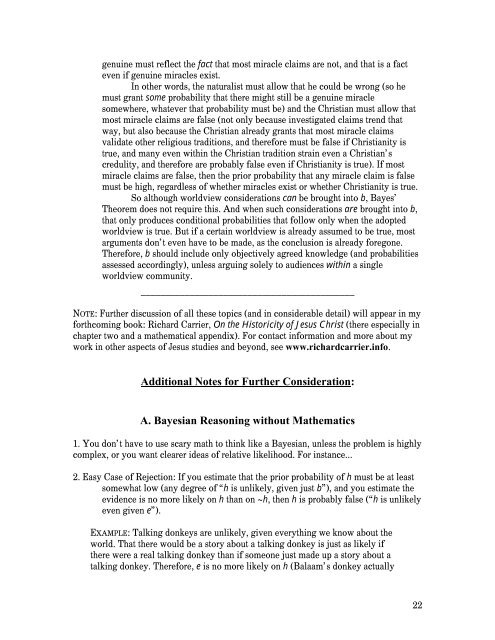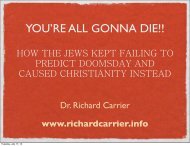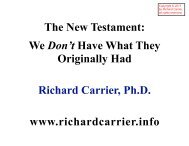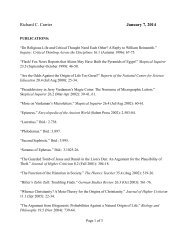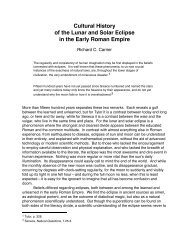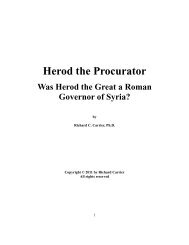“Bayes' Theorem for Beginners: Formal Logic and ... - Richard Carrier
“Bayes' Theorem for Beginners: Formal Logic and ... - Richard Carrier
“Bayes' Theorem for Beginners: Formal Logic and ... - Richard Carrier
Create successful ePaper yourself
Turn your PDF publications into a flip-book with our unique Google optimized e-Paper software.
genuine must reflect the fact that most miracle claims are not, <strong>and</strong> that is a fact<br />
even if genuine miracles exist.<br />
In other words, the naturalist must allow that he could be wrong (so he<br />
must grant some probability that there might still be a genuine miracle<br />
somewhere, whatever that probability must be) <strong>and</strong> the Christian must allow that<br />
most miracle claims are false (not only because investigated claims trend that<br />
way, but also because the Christian already grants that most miracle claims<br />
validate other religious traditions, <strong>and</strong> there<strong>for</strong>e must be false if Christianity is<br />
true, <strong>and</strong> many even within the Christian tradition strain even a Christian’s<br />
credulity, <strong>and</strong> there<strong>for</strong>e are probably false even if Christianity is true). If most<br />
miracle claims are false, then the prior probability that any miracle claim is false<br />
must be high, regardless of whether miracles exist or whether Christianity is true.<br />
So although worldview considerations can be brought into b, Bayes’<br />
<strong>Theorem</strong> does not require this. And when such considerations are brought into b,<br />
that only produces conditional probabilities that follow only when the adopted<br />
worldview is true. But if a certain worldview is already assumed to be true, most<br />
arguments don’t even have to be made, as the conclusion is already <strong>for</strong>egone.<br />
There<strong>for</strong>e, b should include only objectively agreed knowledge (<strong>and</strong> probabilities<br />
assessed accordingly), unless arguing solely to audiences within a single<br />
worldview community.<br />
____________________________________________<br />
NOTE: Further discussion of all these topics (<strong>and</strong> in considerable detail) will appear in my<br />
<strong>for</strong>thcoming book: <strong>Richard</strong> <strong>Carrier</strong>, On the Historicity of Jesus Christ (there especially in<br />
chapter two <strong>and</strong> a mathematical appendix). For contact in<strong>for</strong>mation <strong>and</strong> more about my<br />
work in other aspects of Jesus studies <strong>and</strong> beyond, see www.richardcarrier.info.<br />
Additional Notes <strong>for</strong> Further Consideration:<br />
A. Bayesian Reasoning without Mathematics<br />
1. You don’t have to use scary math to think like a Bayesian, unless the problem is highly<br />
complex, or you want clearer ideas of relative likelihood. For instance...<br />
2. Easy Case of Rejection: If you estimate that the prior probability of h must be at least<br />
somewhat low (any degree of “h is unlikely, given just b”), <strong>and</strong> you estimate the<br />
evidence is no more likely on h than on ~h, then h is probably false (“h is unlikely<br />
even given e”).<br />
EXAMPLE: Talking donkeys are unlikely, given everything we know about the<br />
world. That there would be a story about a talking donkey is just as likely if<br />
there were a real talking donkey than if someone just made up a story about a<br />
talking donkey. There<strong>for</strong>e, e is no more likely on h (Balaam’s donkey actually<br />
22


